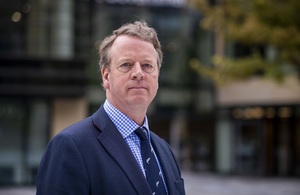Prime Minister announces £50 million investment in grassroots football pitches
The Prime Minister has announced an additional £50 million in grassroots football pitches, to boost the wave of national interest in EURO 2020 and Women’s EURO 2022, and inspire the stars of the future to take up the sport.
The funding, which will be made available next year and prioritised for left-behind communities, will enable more people to access high-quality football pitches that can be used for football and other sports right across the UK. It underlines the Government’s commitment to levelling up.
Speaking from the UK Battery Industrialisation Centre (UKBIC) in Coventry, the Prime Minister outlined the challenges that we face and opportunities we must grasp to make sure that we build back better following the pandemic.
The new £50 million investment will be targeted at left-behind communities and will address health inequalities, encouraging children and young people to get more active while ensuring more people can enjoy our national sport. It is in addition to £25 million for new community football pitches announced by the Chancellor at the Budget earlier this year.
This £50 million investment is a further step towards ensuring that everyone will be an average of 15 minutes from a high-quality football pitch.
Combined with contributions from the Football Association and Premier League as well as other local partners, this latest funding commitment will build 185 new 3G artificial pitches, improve 5,000 existing grass pitches and create 9 ‘hub’ sites with multiple pitches.
Culture Secretary Oliver Dowden said:
On the back of the inspirational success of the Three Lions and as anticipation builds for the women’s Euros next year, we want to seize the moment and build the pitches for a golden decade of football. This investment will provide top facilities for the Kanes, Sterlings and Houghtons of tomorrow to hone their skills.
Playing sport is a fundamental part of building back better and healthier from covid. This extra £50 million funding will ensure that families right across the country have fantastic grassroots facilities on their doorstep. We committed to levelling up and we are delivering.
FA Chief Executive Mark Bullingham said:
Grassroots football facilities play a vital role in the heart of our communities and investment in them has never been more important.
This £50 million from the Government, as part of their £550 million election commitment, will help to change and improve lives. More quality facilities around the country will help us find and inspire the next generation of England stars.
This funding will also play an important part in helping to get people active again and improving the mental and physical health of the nation as lockdown restrictions are lifted.
Premier League Chief Executive Richard Masters said:
It is great news the Government has confirmed this investment into grassroots football pitches at a time when interest in the game is at a high following England’s fantastic EURO 2020 campaign.
These funds will enhance the significant contributions the Premier League, The FA and Government make through the Football Foundation, enabling the delivery of more pitches and facilities in the communities that need them the most and helping to get even more people playing the sport.
Since the start of the coronavirus pandemic, many football clubs at all levels of the UK domestic game have benefited from the multi-billion-pound package of government support, including the furlough scheme and Covid loan schemes.
Last year, the government introduced the £300 million Sport Winter Survival Package to protect spectator sports in England and, at the Budget this year, a further £300 million was announced for a Sport Recovery Package to continue to support clubs as fans return to venues.
Separately, Sport England, which is funded by the government and National Lottery, has provided £220 million to support community sport clubs and exercise centres through the coronavirus pandemic. Sport England has also provided an extra £50 million to help grassroots sports clubs and organisations as part of their Uniting the Movement strategy.
ENDS
Notes to editors:
- According to Sport England 40% of grassroots football clubs in England are in the top 20% most deprived communities.
- This funding will be targeted at areas in categories 1 and 2, as defined in the government’s levelling up fund prospectus: https://www.gov.uk/government/publications/levelling-up-fund-prospectus
